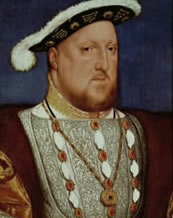Dr. Verena Theile, Assistant Professor

Department of English |
| Study Questions for Henry VIII |
1. Discuss the idea of loyalty in this play as it relates to the downfall of Buckingham, Katharine, Wolsey, Cranmer. Are the characters punished for being loyal or for not being loyal enough? How does their loyalty contribute to their downfall? 2. Discuss the idea of forgiveness in this play, paying particular attention to speeches of Buckingham, Katharine, Wolsey, and Cranmer. Consider forgiveness in terms of the implied religious struggles of this play's era. 3. How does the idea of pity, first mentioned in the Prologue, appear throughout the play? Trace uses of the word and consider how it applies to the events in the play or the speeches of characters. 4. The play is named for the character of Henry VIII; yet is the king the main character? Why or why not? 5. Does anyone in this play truly deserve his or her punishment? Buckingham and Wolsey particularly may have had faults, but do their speeches after punishment make them seem more sympathetic? What about Katharine, who may not be at all to blame for the divorce. Is she a wholly sympathetic character or not? 6. Consider the fragile line between history and literature. The events portrayed in Henry VIII actually took place about 80 years before Shakespeare wrote the play, and his audience would have known the story. How do you think seeing this play would make an audience understand these events, still relatively close to their time, differently? 7. Consider the role of the common people in the play, especially in relation to the discussion of taxation in Act I and the scenes before the baptism in Act V, when Lord Chamberlain mocks them. Are the commoners wholly supportive of the royalty or do they pose a threat of any kind? 8. Cranmer’s prophecy at the close of the play unites the themes of tragic mysticism and national greatness. Substantiate and contextualize, please. |
| Sources: cla.calpoly.edu/~dschwart/teaching.html; english.sxu.edu/boyer; /www.pinkmonkey.com/booknotes; www.sparknotes.com/shakespeare; www.eng.fju.edu.tw/English_Literature/Shakespeare; www.shakespearetavern.com; english.mnsu.edu/faculty/kay_puttock.htm |
Last updated November 2007 |